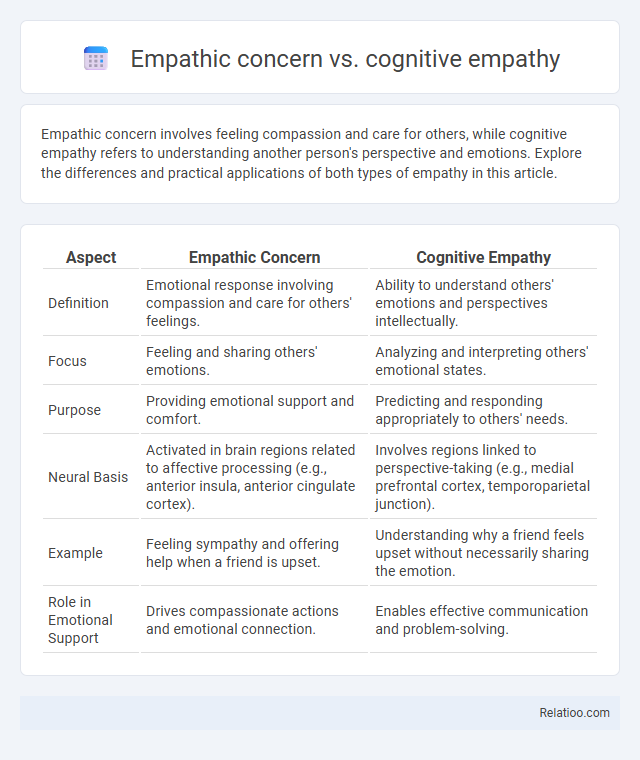Empathic concern involves feeling compassion and care for others, while cognitive empathy refers to understanding another person's perspective and emotions. Explore the differences and practical applications of both types of empathy in this article.
Table of Comparison
| Aspect | Empathic Concern | Cognitive Empathy |
|---|---|---|
| Definition | Emotional response involving compassion and care for others' feelings. | Ability to understand others' emotions and perspectives intellectually. |
| Focus | Feeling and sharing others' emotions. | Analyzing and interpreting others' emotional states. |
| Purpose | Providing emotional support and comfort. | Predicting and responding appropriately to others' needs. |
| Neural Basis | Activated in brain regions related to affective processing (e.g., anterior insula, anterior cingulate cortex). | Involves regions linked to perspective-taking (e.g., medial prefrontal cortex, temporoparietal junction). |
| Example | Feeling sympathy and offering help when a friend is upset. | Understanding why a friend feels upset without necessarily sharing the emotion. |
| Role in Emotional Support | Drives compassionate actions and emotional connection. | Enables effective communication and problem-solving. |
Introduction to Empathic Concern and Cognitive Empathy
Empathic concern involves the ability to feel compassion and concern for others' emotional experiences, guiding prosocial behaviors and emotional support. Cognitive empathy refers to the capacity to understand and accurately perceive another person's thoughts and feelings without necessarily sharing the emotional experience. You can enhance interpersonal relationships by distinguishing between these forms of empathy, applying empathic concern to foster emotional connection and cognitive empathy for effective perspective-taking.
Definitions: What Is Empathic Concern?
Empathic concern refers to the emotional response of feeling compassion and care for others' suffering, driving altruistic behavior and support. Cognitive empathy involves understanding another person's perspective or mental state without necessarily sharing their emotional experience. While empathic concern is linked to emotional motivation for helping, cognitive empathy focuses on intellectual comprehension of others' feelings and thoughts.
Definitions: What Is Cognitive Empathy?
Cognitive empathy refers to the ability to understand another person's perspective and emotions without necessarily sharing their feelings, enabling you to accurately interpret their mental state. Empathic concern involves feeling compassion and care for others' well-being, often motivating prosocial behavior, while emotional empathy means sharing or mirroring the emotional experiences of others. Your ability to distinguish cognitive empathy from empathic concern enhances interpersonal communication and emotional intelligence by recognizing when understanding someone's emotions differs from emotionally engaging with them.
Key Differences between Empathic Concern and Cognitive Empathy
Empathic concern involves feeling compassion and emotional responses toward someone else's suffering, driving altruistic behavior, whereas cognitive empathy refers to the ability to understand another person's perspective and emotions without necessarily sharing their feelings. Your ability to engage empathic concern leads to emotional connection and caregiving motivation, while cognitive empathy underpins effective communication and social interaction by accurately interpreting others' mental states. Distinguishing these two forms of empathy is crucial for developing emotional intelligence, as empathic concern emphasizes emotional resonance, and cognitive empathy focuses on intellectual understanding.
Psychological Foundations of Empathic Concern
Empathic concern is rooted in affective empathy, involving emotional responses to others' distress and motivating prosocial behavior, primarily governed by activation in the anterior insula and anterior cingulate cortex. Cognitive empathy, in contrast, relies on mentalizing and theory of mind processes, engaging the medial prefrontal cortex and temporoparietal junction to understand another's perspective without necessarily sharing their emotions. Psychological foundations of empathic concern emphasize evolutionary and developmental mechanisms where emotional contagion and caregiving systems foster compassion and altruism, distinguishing it from cognitive empathy's more detached perspective-taking functions.
Psychological Mechanisms of Cognitive Empathy
Cognitive empathy involves the psychological mechanism of perspective-taking, enabling individuals to understand others' thoughts and intentions without necessarily sharing their emotions. This process primarily engages brain regions such as the medial prefrontal cortex and temporoparietal junction, which are critical for mentalizing and theory of mind. Empathic concern differs by involving affective responses, driven by emotional contagion and activation of the anterior insula and anterior cingulate cortex, highlighting distinct neural pathways underlying emotional versus cognitive components of empathy.
Real-World Applications: Where Each Empathy Type Matters
Empathic concern plays a critical role in caregiving and humanitarian work by driving compassionate actions and emotional support. Cognitive empathy is essential in conflict resolution and negotiations, enabling individuals to understand others' perspectives without emotional involvement. Empathic concern combined with cognitive empathy enhances leadership effectiveness by fostering trust and motivating cooperative behavior.
Empathic Concern vs Cognitive Empathy in Relationships
Empathic concern involves feeling compassion and warmth toward others, driving prosocial behaviors and emotional support in relationships. Cognitive empathy is the ability to understand another person's perspective and thoughts without necessarily sharing their emotions, enhancing communication and conflict resolution. In relationships, empathic concern fosters deep emotional connection and care, while cognitive empathy contributes to mutual understanding and effective problem-solving.
Enhancing Empathic Concern and Cognitive Empathy Skills
Empathic concern involves feeling genuine compassion and care for others' well-being, while cognitive empathy refers to the ability to understand another person's perspective and emotions without necessarily sharing their feelings. Enhancing your empathic concern can be achieved through mindfulness practices and active listening, which foster emotional connection and compassion. Improving cognitive empathy requires perspective-taking exercises and reflective thinking that promote deeper understanding of others' mental states and experiences.
Conclusion: Integrating Both Types for Effective Empathy
Empathic concern involves feeling compassion and care for others' emotions, while cognitive empathy emphasizes understanding others' perspectives and thoughts. Integrating both types enhances your ability to respond appropriately and supportively in social interactions. Combining emotional responsiveness with intellectual understanding leads to more effective and balanced empathy in personal and professional relationships.

Infographic: Empathic concern vs Cognitive empathy
 relatioo.com
relatioo.com